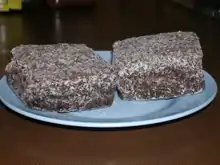lamington
See also: Lamington
English

Lamingtons (small cakes)
Alternative forms
- leamington, lemmington
Etymology
Uncertain. Although current dictionaries all associate it with Charles Cochrane-Baillie, 2nd Baron Lamington, the earliest publication of this derivation is by John Hepworth in the Nation Review of July 1977. An earlier (1966) reference[1] gives the cake but does not associate it with the Baron, suggesting the theory was not current in the 1960s.[2] It has also been claimed that the name comes from Lamington, South Lanarkshire.
Pronunciation
- IPA(key): /læmɪŋtən/
Audio (AU) (file)
Noun
lamington (plural lamingtons)
- (chiefly Australia and New Zealand) A small square Australian/New Zealand cake made with sponge cake covered on all sides (including top and bottom) with chocolate and desiccated coconut.
- 2000, Patrick Mullins, Chris Kynaston, “The Household Production of Subsistence Goods”, in Patrick Nicol Troy, editor, A History of European Housing in Australia: The Urban Peasant Thesis Reassessed, page 146:
- Women were also known for their cooking skills although this was not so much in the provision of meals (which were ‘simple and wholesome’), but in the production of confectionery, ranging from scones, biscuits, sponges, cakes, etc., to such noted Australian and New Zealand delicacies as lamingtons and pavlova.
- 2003, Dawn Marie Schrandt, Just Me Cookin Cakes, page 136:
- Lamingtons are little sponge cakes coated in chocolate and grated coconut.
- 2005, Pippa Cuthbert, Lindsay Cameron Wilson, Ice Cream!, page 118:
- Lamingtons are a traditional New Zealand tea-time treat: plain sponge dipped in a chocolate sauce and coated with coconut.
- 2021 April 14, David Astle, “Lamington wars: claiming an Australian invention really takes the cake”, in The Age:
- Enter James Lambert, word detective. Goaded by Priol’s anagram, Lambert doubted the Shaky Isles’ equally rickety claims on the lamington. Steal the pavlova if you must, but only an April Fool would deem the lamington a Kiwi import.
Related terms
References
- 1966, Sidney J. Baker, The Australian Language, second edition, page 86.
- Australian National University OzWords May 1999.
This article is issued from Wiktionary. The text is licensed under Creative Commons - Attribution - Sharealike. Additional terms may apply for the media files.